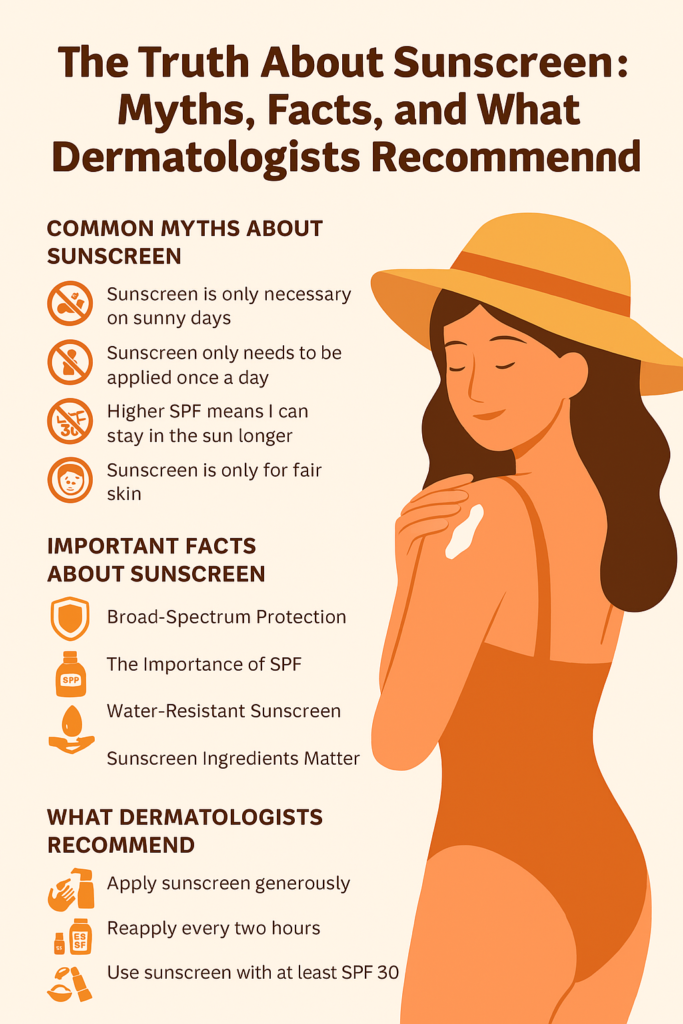Sunscreen is one of the most widely used skincare products around the globe, and yet, it remains the subject of numerous myths and misconceptions. Whether it’s due to conflicting advice or a lack of understanding about its importance, many people are still not using sunscreen correctly. So, what is the truth about sunscreen, and how can you make sure you’re applying it in the best way? Let’s dive into the myths, facts, and expert recommendations about sunscreen that can help you protect your skin effectively.
Common Myths About Sunscreen
1. Sunscreen is only necessary on sunny days This is one of the most persistent myths surrounding sunscreen. Many people believe that sunscreen is only required when it’s sunny, but the truth is that UV rays can damage your skin even on cloudy days. In fact, up to 80% of UV rays can reach your skin through clouds. Dermatologists recommend wearing sunscreen every day, regardless of the weather, to protect against UV damage.
2. Sunscreen only needs to be applied once a day Another common misconception is that applying sunscreen once in the morning is enough for the entire day. In reality, sunscreen needs to be reapplied every two hours, especially if you’re swimming, sweating, or spending time outdoors. Sunscreen can wear off due to sweat or water, so reapplying is crucial for consistent protection.
3. Higher SPF means I can stay in the sun longer A higher SPF doesn’t mean that you can stay out in the sun for longer periods of time. For example, SPF 50 doesn’t allow you to stay in the sun 50 times longer than you could without protection. SPF measures the amount of UVB radiation that reaches your skin. Higher SPF numbers block a higher percentage of UVB rays, but no sunscreen can block 100% of UV rays. It’s important to note that no matter the SPF, sunscreen should be reapplied regularly.
4. Sunscreen is only for fair skin Some people believe that sunscreen is only needed by those with fair skin, but that’s simply not true. People with darker skin tones may have more natural protection against UV rays, but they are still at risk for sunburn, premature aging, and skin cancer. The risk of skin damage is present for everyone, regardless of skin color.
Important Facts About Sunscreen
1. Broad-Spectrum Protection When choosing a sunscreen, look for one that offers broad-spectrum protection. This means the sunscreen protects against both UVA and UVB rays. UVB rays are primarily responsible for sunburn, while UVA rays penetrate deeper into the skin and contribute to premature aging and skin cancer. Broad-spectrum sunscreens ensure you’re protecting your skin from both types of harmful rays.
2. The Importance of SPF SPF, or sun protection factor, is a key factor in choosing sunscreen. It indicates the level of protection it provides against UVB rays. For daily use, dermatologists typically recommend a sunscreen with at least SPF 30, as it blocks 97% of UVB rays. However, if you are planning to spend extended time outdoors or near reflective surfaces like water or snow, an SPF of 50 or higher is recommended.
3. Water-Resistant Sunscreen If you plan on swimming or engaging in activities that may cause sweating, you should use a water-resistant sunscreen. These formulas are designed to stay effective even when exposed to water or perspiration. However, it’s important to reapply every two hours, as even water-resistant sunscreens can lose their effectiveness over time.
4. Sunscreen Ingredients Matter There are two main types of sunscreen: chemical and physical (mineral). Chemical sunscreens absorb UV rays, while physical sunscreens reflect them. Physical sunscreens contain ingredients like zinc oxide or titanium dioxide and are often recommended for sensitive skin, as they are less likely to cause irritation. On the other hand, chemical sunscreens often offer more lightweight formulations but may cause skin irritation for some people.
What Dermatologists Recommend
Dermatologists generally agree on several key factors when it comes to sunscreen use. These include:
- Apply sunscreen generously: Most people don’t use enough sunscreen. Experts recommend applying at least one ounce (about a shot glass full) to cover your body. Don’t forget areas like your ears, back of your hands, and feet.
- Reapply every two hours: Sunscreen loses its effectiveness over time, especially if you’re sweating or swimming. Make sure to reapply regularly to maintain protection.
- Use sunscreen with at least SPF 30: For daily use, an SPF of 30 or higher is sufficient. If you’re planning to spend more time outdoors, go for a higher SPF.
- Don’t skip lip protection: The lips are often overlooked when it comes to sunscreen. However, they are equally at risk for UV damage. Use a lip balm with SPF to protect your lips from the sun.

Sunscreen Protection: A Quick Comparison
| SPF | Percentage of UVB Rays Blocked | Recommended Use |
|---|---|---|
| SPF 15 | 93% | Everyday use |
| SPF 30 | 97% | Recommended for daily use |
| SPF 50 | 98% | Extended outdoor exposure |
| SPF 100 | 99% | Extreme outdoor conditions |
Important FAQs About Sunscreen
Q: How much sunscreen should I apply?
A: Dermatologists recommend using about one ounce (a shot glass full) of sunscreen to cover your entire body. Don’t forget areas like your ears, back of your hands, and feet.
Q: How often should I reapply sunscreen?
A: Reapply sunscreen every two hours, or more often if you’re swimming or sweating. Even water-resistant sunscreens need to be reapplied after water exposure.
Q: Can I skip sunscreen if I’m indoors?
A: Even indoors, you’re exposed to UVA rays through windows. It’s still a good idea to wear sunscreen, especially if you’re near a window or using screens for extended periods.
Q: Is there a sunscreen that’s safe for sensitive skin?
A: Yes! Look for physical (mineral) sunscreens with ingredients like zinc oxide or titanium dioxide, as they are less likely to irritate sensitive skin.
Q: Is sunscreen necessary for darker skin tones?
A: Yes, everyone needs protection from UV damage, regardless of skin tone. People with darker skin may have some natural protection but are still at risk for premature aging, sunburn, and skin cancer.
For more information on skin health and sunscreen, check out the blog at Healthy Vibe Hub.
By using sunscreen consistently and correctly, you can ensure your skin stays protected and healthy for years to come. Remember to apply generously, choose the right SPF for your activities, and reapply regularly. Don’t fall for common myths – make sunscreen a part of your daily skincare routine!


